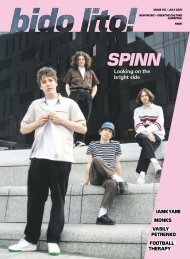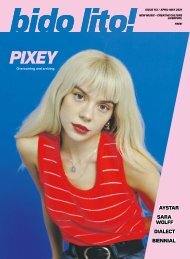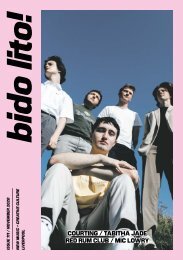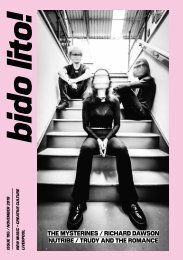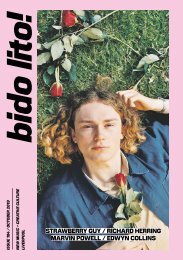Bluedot Volume1
Bluedot - a festival of discovery at Jodrell Bank | 22.23.24 July 2016. A preview magazine featuring interviews with Jean-Michel Jarre, Air, Public Service Broadcasting, Mercury Rev, The Infinite Monkey Cage and more. www.discoverthebluedot.com
Bluedot - a festival of discovery at Jodrell Bank | 22.23.24 July 2016. A preview magazine featuring interviews with Jean-Michel Jarre, Air, Public Service Broadcasting, Mercury Rev, The Infinite Monkey Cage and more. www.discoverthebluedot.com
You also want an ePaper? Increase the reach of your titles
YUMPU automatically turns print PDFs into web optimized ePapers that Google loves.
AIR<br />
coming back to life.” That’s how<br />
Jean-Benoît Dunckel describes AIR in<br />
2016.<br />
This year, he and Nicolas Godin are<br />
“Ghosts<br />
revitalising a project that germinated<br />
when they met as teenage school kids in Versailles in<br />
the late 1980s. After 21 years and seven albums (eight if<br />
you include 2000’s teenager-slaying soundtrack for Sofia<br />
Coppola’s The Virgin Suicides), last month these masters<br />
of heart-prodding electronic music released Twentyears,<br />
a meticulously collated anthology of singles, rarities,<br />
remixes and unreleased tracks.<br />
The pair formed Air in 1995, splintering into a duo after<br />
three years playing in Orange with disco musician Xavier<br />
Jamaux and Alex Gopher, who’s now a house DJ. Dunckel<br />
and Godin had busied themselves with solo projects since<br />
2014’s limited edition release for Lille’s Palais Des Beaux<br />
Arts, Music For Museum, but are now back together and<br />
on the road.<br />
As part of an eclectic interview conducted via email,<br />
Dunckel describes the shows – during which the now<br />
46-year-old pair bob side-by-side behind their keyboards,<br />
triggering twinkling choruses and heady waves of<br />
electronic noise like Venus, Cherry Blossom Girl and Kelly<br />
Watch The Stars – as “energetic”. He adds that they wear<br />
all white onstage too, which chimes nicely with his ghostly<br />
metaphor.<br />
His comparison – and the astronaut-hued outfits –<br />
shouldn’t come as much of a surprise: Air have been<br />
dabbling in space and science fiction since the release of<br />
their 1998 debut album Moon Safari. The video for that<br />
record’s Sexy Boy featured an animated monkey flying<br />
to the Moon. Dunckel puts the duo’s fascination with<br />
galaxies far, far away down to the fact that human beings<br />
are “stardust”, and has understandably fond memories of<br />
recording Air’s most recent album, the first original score<br />
for Le Voyage Dans La Lune, in 2012.<br />
The 1902 silent short, directed lavishly by George<br />
Méliès, charts the journey of a team of astronomers to the<br />
Moon and is often held up as the first ever science fiction<br />
film. “I was impressed because it’s from 1902,” says<br />
Dunckel, “it’s people from another age moving in front<br />
of your eyes.” But he reserves highest praise for Méliès’<br />
“simple magic effects, such as when the characters just<br />
vanish into the background”.<br />
An extra quirk came with the fact that Méliès is<br />
buried close to Air’s Paris studio, but Dunckel’s answer<br />
as to whether that brought them any closer to the man<br />
who made the film is short and simple: “Non.” His<br />
response when asked whether he thinks the band will<br />
draw inspiration from outer space in the future is exactly<br />
the same.<br />
Indeed, Dunckel won’t be drawn on Air’s future at<br />
all: “It’s hard to see the future because it’s constantly<br />
changing depending on the present, which is unstable.”<br />
If these childhood friends are going to hide out in their<br />
wood-panelled studio to cook up an album to follow<br />
Le Voyage De La Lune, you get the feeling they’ll do so in<br />
secret, content to let the intrigue build.<br />
But to pick away at that answer, and many of Dunckel’s<br />
others, is to reveal a portrait of a band revelling in a rich<br />
history, still intent on eliciting feelings from anyone who<br />
listens. Never mind ghosts coming back to life, Air are<br />
exactly where they were back in 1995: lost in their own<br />
world of space and sound.<br />
You started Air in 1995, how did you want the band to<br />
come across back then?<br />
Jean-Benoît Dunckel: We presented the band to the word.<br />
We particularly wanted to explain that we were not DJs<br />
and that we were playing everything.<br />
What are the main things you have learnt about yourselves<br />
since those days?<br />
JBD: That you can’t make omelettes without breaking<br />
eggs, that it’s hard to achieve something without reaching<br />
every goal. I was thinking that I had a blurry vision of<br />
a perfect career but I had a perfect vision of a blurry<br />
career.<br />
Did you have any disagreements over the tracklisting<br />
for Twentyears?<br />
JBD: No the best of was fun to do. It’s an audio travel<br />
in time. It was interesting to see the different turns of the<br />
sound. We mutated, we incorporated more voices, and at<br />
the same time, we started to be more experimental.<br />
Did you discover anything about yourselves while<br />
collating it?<br />
JBD: I understood how right and inspired we were.<br />
The third disc on Twentyears is full of remixes – what are<br />
your favourites?<br />
JBD: I like the Bowie one [A Better Future]. It was impressive<br />
to have a David Bowie song sung a cappella.<br />
You’ve also worked with Jean-Michel Jarre on the track<br />
Close Your Eyes for the 2015 compilation Electronica 1:<br />
what are your memories of that?<br />
JBD: Good memories. Jean-Michel is a friendly, clever<br />
person. We also discovered his studio. It was electronic<br />
pornography. So many keyboards.<br />
You once called your Paris studio a “Star Wars spaceship<br />
with the equipment of Stevie Wonder”. What’s it really<br />
like inside?<br />
JBD: It’s a recording studio full of electronic keyboards<br />
and instruments. There’s lots of wood so it feels like you’re<br />
in California.<br />
What are the biggest changes – musically, personally and<br />
in the environment the band exists in – since you began?<br />
JBD: We spent so much time in the studio and learnt<br />
many recording techniques. But the more I was learning<br />
things the more I thought I should unlearn how to record.<br />
Because inspiration is the most important thing. It’s about<br />
how to translate a feeling.<br />
“Computers are just<br />
tools. It’s just about<br />
capturing the human<br />
feeling through<br />
melodies and rhythms”<br />
Can you describe the connection between the two of you?<br />
JBD: We are very different with a lot of common tastes.<br />
We’re complete.<br />
Do you know each other’s secrets?<br />
JBD: Yes, a little bit.<br />
You’ve previously spoken about having an obsession with<br />
making “timeless” music. Is that still the case?<br />
JBD: We were not into the fashion of music. We didn’t<br />
want to be played in clubs or on the radio. We wanted to<br />
become a cult band, [making] necessary music to make<br />
the people feel high and at peace.<br />
In 2009, you told Pitchfork: “We play the machines<br />
and the machines play us”. How do you assess using<br />
electronic keyboards and computers to make emotional<br />
music?<br />
JBD: Computers are just tools. It’s just about capturing<br />
the human feeling through melodies and rhythms;<br />
I like to record me playing and not program anything.<br />
Also, computers show us some ways of editing music.<br />
Machines play right at the same tempo. Humans don’t.”<br />
How do you want people to react to Air?<br />
JBD: I want people to caress themselves by listening to<br />
our records. But maybe they’ve got something else to do.<br />
I hope they’ll space out.<br />
The Moon, space and travel have often crept into your<br />
work, why the fascination?<br />
JBD: Because we’re stardust, that’s what we really are:<br />
turning on a planet during a short lifetime, and the only<br />
way to feel really at peace is to never forget that<br />
aircheology.com<br />
WITTEN BY BEN HOMEWOOD<br />
PHOTO BY LINDA BUJOLI<br />
LOVELL STAGE<br />
SATURDAY<br />
15 | DISCOVERTHEBLUEDOT.COM






